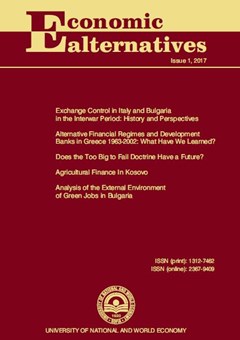Exchange Control in Italy and Bulgaria in the Interwar Period: History and Perspectives
Authors: Nikolay Nenovsky, Giovanni Pavanelli, Kalina Dimitrova
Abstract
This paper analyses exchange control in Italy and Bulgaria during the interwar period. Starting with the chronology of events, the study provides a detailed account of the institutional and economic framework in which these measures were enforced and interprets them by exploring various sources of information and data. Moreover, it suggests a theoretical interpretation of exchange control measures stressing that these policies were a serious interference in market mechanisms. A further point is that exchange control in both countries was an eloquent example of how serious the balance of payments constraint was at that time and how difficult it was to circumvent it. Subject to discussion, the paper derives some lessons for today’s economies.

